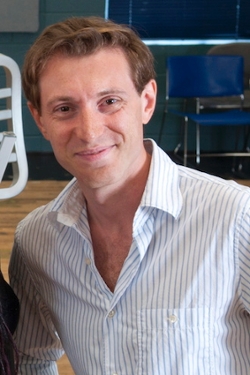Dmitry Troyanovsky '98 Brings a World of Experience to Theater Arts
 Nov. 3, 2015
Nov. 3, 2015
By Ingrid Schorr | Office of the Arts
This article originally appeared in the fall 2015 issue of State of the Arts. It is published to BrandeisNOW as part of an ongoing series spotlighting new Brandeis faculty.
Russian-born, Brandeis-educated Dmitry Troyanovsky ’98 has made an international name for himself as a director who creates fresh theater from classic texts.
In his recent production of the commedia dell’arte “King Stag” in Shanghai, actors spun, leapt and catapulted off a huge red seesaw, a spectacle that was as emotional as it was dazzling. In Sarasota, Fla., his stripped-bare Shakespeare stunned audiences with potent imagery and poignant insight.
This fall, Troyanovsky returns to Brandeis as assistant professor in theater arts. He took a break from rehearsing Sarah Kane’s “4.48 Psychosis” at the Shanghai Dramatic Arts Ceter to recall his seminal undergraduate experiences, from conquering the baffling circular floor plan of the Spingold Theater Center to directing Associate Professor of Theater Arts Marya Lowry.
As a theater artist, you create worlds from your experience and from your imagination. What was your favorite place at Brandeis, and what did it mean to you?
I have two. The first is Spingold — because I spent so much time there, of course, and because it quite literally changed my life. On my very first day of class, there was an announcement that a new play would be auditioning, and everyone was welcome to try out. So I went into this round building and walked round and round, but I couldn’t find the auditions. There was no sign and I didn’t know about the lower floors yet. I was about to leave but something told me to go for one last circle. That’s when I ran into someone who showed me where to go. My whole life became defined by that extra spin. I was cast in “The God of Isaac,” by James Sherman, and after that I decided I would major in theater.
My other favorite place is the Fellows Garden. I was always waiting for that time of year, when the cherry trees would bloom.
When did you first try your hand at directing?
In my freshman year I took Arthur Holmberg's class on avant-garde theater. He asked who wanted to direct the class in an Italian futurist play and I jumped at the opportunity to direct for the first time.
One of the greatest things about Brandeis was that I was supported on every level — by my teachers, the theater department, and other mentors. The play I directed in my senior year for the Festival of the Arts, “Medeamaterial,” by Heiner Müller, is one of the more important events of my directorial life. I thought it was a great piece for Marya Lowry to perform, so I was daring and I approached her. She said yes, to my great pleasure and surprise.
Marya was so generous with me as an artist. She was willing to be directed by a 21-year-old. She was interested in what I was trying to do. And we discovered things together — a new aesthetic, a new theatrical language. New to me at the time.
One of the things that I treasure about Brandeis is that my teachers treated me as if I were a junior colleague, an artist in the making. That was so important. It made me realize: “I can do this. It’s not a delusion. It might be extremely difficult but it’s possible.”
You'll be teaching directing and improvisation this year, and advising senior thesis projects. What advice do you have for your students? Or for any student of the arts?
Be open to possibilities. You might not know where your real talents are hiding. Your professors and mentors will point them out to you, but you have to be open and curious.
A dramaturge mentor of yours, an American, says Russian theater artists are “basically expressionists.” Do you agree with that description?
Yes, that’s true to a large extent. People think of Russian theater as the great home of realism or naturalism, and they are surprised when they see Russian productions by the nonrealism of it all.
Having left Russia for the U.S. when you were a teenager, do you still consider yourself a Russian theater artist?
I think of myself as a Russian-influenced theater artist. In Russia, you always feel that theater matters, that it’s not just a diversion or facile entertainment for the privileged few. It’s a place to have profound emotional and intellectual experiences. A vital space where we can communicate with each other on many imaginative and metaphoric levels.
Having an international or different kind of background can be useful for an artist, especially when you come from a place like the former Soviet Union. You feel that you’re carrying a different sense of history. I still have moments when I feel disconnected from certain cultural habits or ways of thinking. The eternal American optimism is still a mystery to me. But I should add that my “neither here nor there” state of mind isn’t always a negative. It forces me to forge my own unique identity as an artist. Perhaps it makes me more flexible. Not a bad ability in a rapidly globalizing world.






